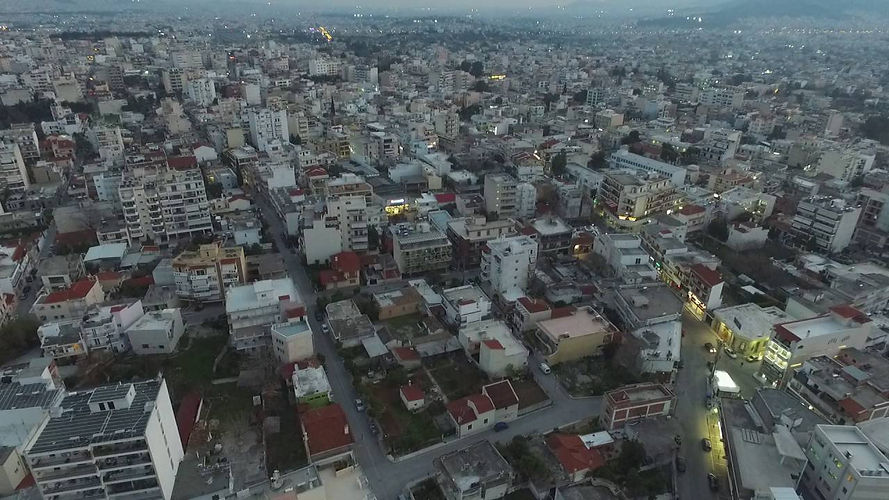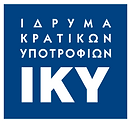top of page

Environmental Dimensions of Food Production and Processing
During 4 consecutive days, 34 students and 10 teachers from the collaborating schools and 7 members (4 students and 3 teachers) from the NGO USGGED collaborated in a series of activities carried out in English with the aim of creating the final products of the visit as specified in the project proposal. In order to increase the impact of the activity, an additional 12 students from the Agriculture, Food and Environment Department of the 1st EPAL of Nafpaktos participated in the first day's program, accompanied by 3 teachers.
The activities were held at the 2nd Evening EPAL of Acharnes school, the 5th Laboratory Center of East Attica that serves the school, as well as on-site visits by students and teachers to collaborating institutions and organizations.
Our activities started on the 12th of March with a visit to the Food Expo- Greece exhibition, where the students participated in an interactive “hidden treasure” game, being asked to solve riddles on printed cards that the coordinator of the 2nd Evening EPAL of Acharnes had given them. Through this activity, they toured kiosks with basic products of the Mediterranean Diet (feta, gruyere, honey, olives, olive oil, aromatic herbs, cereals), carried out an organoleptic evaluation and recorded their findings on the Twinspace platform of the eTwinning project. In the afternoon, after a short break at the McArthur Glen Discount Village, in Spata, Attica, the Welcome Ceremony took place at the 2nd Evening EPAL of Acharnes, in the presence of the Deputy Mayor of Education and Preschool Education of the Municipality of Acharnes, Mr. Nikolaos Damaskos. During the event, the results of the statistical analysis of the Annual MedDiet Score Survey were presented, which assesses the degree of commitment of the participants in the program to the Mediterranean Diet and will be presented with a presentation at the 11th International Scientific Conference (IACE) in May. Afterwards, the students participated in the “Glow and Grow” get-to-know-you activity. At the same time, the teachers had the opportunity to discuss the schedule and progress of the project work. This was followed by a tour of the school facilities, exchange of experiences and good practices and teamwork on the project’s Twinspace platform in the IT laboratories of the 5th EC of East Attica. Due to the workload in the Twinspace, the completion of the Final MedDiet Score Survey was agreed to take place at the next meeting at the school. Finally, the guests were transferred to the Athenaeum K29 hotel, in the center of Athens, accompanied by the school coordinator.
The second day (11/03/2025) was an exciting journey into the world of olive oil, the king ingredient of the Mediterranean Diet. The participants in the program visited Kalamata, a city with a long-standing heritage as a center for olive oil production and one of the six Greek cities participating in the European initiative "100 Climate Neutral and Smart Cities by 2030", in order to explore sustainable olive farming and enjoy exquisite olive oil tastings. The transfer was made by a bus rented from the "Maltzaris" agency.
After a stop at the archaeological site of Mycenae, the trip continued to Kalamata where an educational visit was held at the Agricultural Olive Cooperative. Under the guidance of Mr. Michalis Antonopoulos, President of the Kalamata A.E.C., Geologist-Geotechnical Engineer and Environmental Consultant for Climate Change, the participants had the opportunity to learn about the sustainable management of olive cultivation and the environmentally friendly methods of olive oil production, which support the transition to a more resilient and sustainable food system. Our next stop was at the School of Agriculture and Food of the University of the Peloponnese (as part of the action “Schools Go to University”), and specifically at the Departments of Agriculture and Food Science and Technology. After the welcome speech by the President of the Department of Agriculture, Mr. Anastasios Darras, there was a presentation by Professor Mr. Theodoros Varzakas (Department of Food Science and Technology) on the topic of Climate Change and food safety (Polyfluorinated Alkylated Substances – PFAS). Professor Vasilios Dimopoulos from the Department of Agriculture and Ms. Ioanna Miliouni, Head of Quality Assurance & Communication at the Olive Oil Tasting Laboratory, implemented an olive oil tasting laboratory.
The visit concluded with guided tours of two specialized laboratories: a) the Physiochemistry, Organoleptic Analysis and (Bio)Chemistry of Food by Professor Mr. Ioannis Kapolos (Department of Food Science and Technology) and b) Tissue Culture, by Associate Professor Mr. Epaminondas Kartsonas (Department of Agriculture). After a short break in Kalamata, we returned late in the afternoon.
On the third day of the Activity (12/03/2025), before the day's program began at noon, the coordinator and members of the pedagogical team from the 2nd Evening EPAL of Acharnes picked up the partners from the hotel early and walked together to the Varvakeio market, took a tour of the antiquities of the center and ended up in Monastiraki. The day's program began with a visit to the Alea Brewing Co. microbrewery by Mr. Manta Thanos, head of the Alea Brewing Co. team. and co-founder. The participants got to know the beer production process through fermentation up close and were informed in detail about the environmentally friendly practices applied by the small-scale local microbrewery at all stages of processing.
The next stop was the Eugenia-Christomelo Beekeeping Farm in Acharnes, which is a family business run by a student of the 2nd Evening EPAL of Acharnes who is participating in the Erasmus+ project. There, the participants followed the integration of sustainable agriculture, traditional livestock farming and beekeeping, in a journey “from field to plate”. Through outdoor STEM activities and experiential experiences, they gained valuable knowledge about Food Science and Technology, as well as traditional and modern agricultural methods. They observed beehives, studied the pasteurization process and made white cheese. They analyzed different types of honey with a refractometer to compare sugar content, evaluated taste, aroma and color, planted potatoes, collected fresh eggs and harvested vegetables from the garden. The experience concluded with a “farm to table” meal based on local zero-food-mile ingredients.
At school, participants attended two webinars via Webex: (a) “Environmental challenges related to food” by Ms. Vasiliki Sfika, Seconded National Expert at EFSA (European Food Safety Authority), and (b) “Local crop varieties and their role in modern agriculture” by Professor Penelope Bembeli of the Agricultural University of Athens. The second presentation was moved from the fourth day's program to the third, as the Agricultural University of Athens was under occupation and it was not clear whether we would be able to visit it the next day. After the interesting presentations, the participants completed the Final Med Diet Score. This was followed by a tour of the laboratories of the 5th Laboratory Center of East Attica by the Director, Mrs. Marianthi Mylona. The students worked again in the Twinspace of the project and then headed to the Food Technology Laboratory, where the students celebrated World Obesity Day 2025 together. Using the laboratory's Mediterranean Food Pyramid, they constructed a version of it based on the dietary choices of the previous day, and a discussion followed. Using a skinfold caliper to measure body fat and special tables, the participants discussed body composition (fat percentage, body weight) and methods for assessing obesity. The students then wrote personal messages of support for people facing obesity problems and shared their own nutritional improvement goals, which they placed on the “Tree of Life”. Since it would be the last visit to the school, the participants chose to award certificates of participation on this day.
On the last day of the Activity (13/03/2025) the participants visited the Agricultural University of Athens as part of the “Schools Go to University” initiative. Assistant Professor Michael Goliomitis from the Department of Animal Production Science gave them a tour of the University’s Livestock Farm, presenting smart farming techniques in egg production, cattle farming using orange by-products and mushroom cultivation residues in the context of the Circular Economy, sheep, goats and chicken farming. In addition, Professor Georgios Papadomichelakis offered a detailed tour of the University’s animal feed factory and its production line. This was followed by free time in the center of Athens where the professors also had time to design their Europass certificates. Cultural activities followed with visits and guided tours of the Acropolis and the Acropolis Museum by a colleague of the 2nd Evening EPAL of Acharnes, a member of the Pedagogical Team, offering the participants a taste of the rich historical heritage of Greece.
bottom of page









